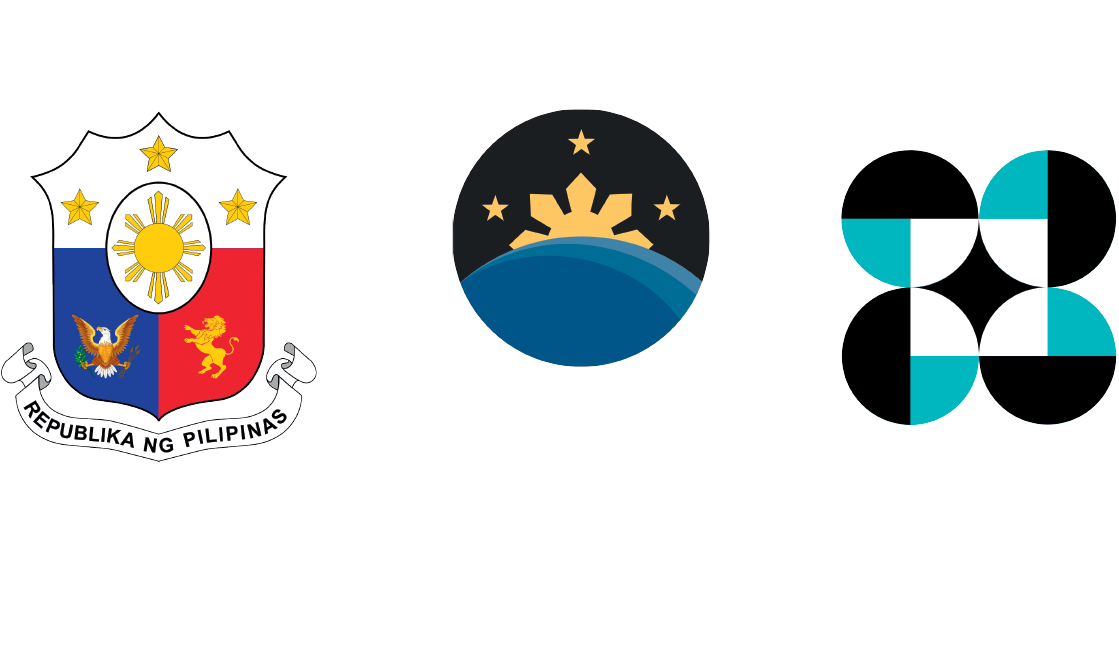




About the CopPhil Initiative
Launched on 24 April 2023, the objective of the European Union Copernicus programme in the Philippines (CopPhil) is to strengthen and promote the operational uptake of free and open Copernicus data in the Philippines through the establishment of the CopPhil Centre. As a flagship and unique programme of the EU’s Global Gateway strategy, CopPhil is designed to harness digital resources and space technology for sustainable development and to support innovations in research and business in close cooperation with government partners. In particular, the Centre will support and increase the ability of the Philippines to address climate vulnerability and biodiversity conservation while improving hazard management and resilience.
The initiative is structured into three components:
- The establishment of a Copernicus Data Centre and IT infrastructure
- The development of Earth Observation pilot services in three thematic areas
- Awareness-raising and knowledge and skills transfer related to the use of Copernicus data and information.
CopPhil is managed by the European Union Delegation to the Philippines. It is implemented by the European Space Agency (ESA) in partnership with the Philippine Space Agency (PhilSA) and the Philippine Department of Science and Technology (DOST).
About the CopPhil Technical Assistance
The activities of the CopPhil Technical Assistance are carried out by a team of dedicated experts whose task is to raise awareness and promote skills in the application of Earth Observation, particularly in disaster risk management, climate change, and land use planning.
The team provides a series of capacity-building activities which are tailored for local governmental units across the Philippines. The activities include advocacy, outreach, and the dissemination of results to relevant agencies, expanding the Copernicus stakeholder network in the Philippines.
Moreover, one of the objectives of this component of the CopPhil initiative is to build capacity through technical expertise exchanges between the European Union and the Philippines, including support for scholarships at the PhD and/or master’s level, allowing selected students to pursue advanced studies in various Copernicus applications at leading institutions across Europe.
About the CopPhil Pilot Services
The Philippines is particularly vulnerable to the effects of climate change. As part of its activities, the CopPhil Centre will co-develop Earth Observation-based pilot services together with Philippine stakeholders, leveraging Copernicus data in three thematic areas:
- Ground motion monitoring: to improve hazard management capacity, reduce risks, and support sustainable urban development;
- Land cover, forest, and crop mapping: to support local authorities, farmers, and environmental managers in promoting sustainable land use and improving agricultural productivity;
- Coastal marine (benthic) habitat monitoring: to support sustainable coastal management, the preservation of biodiversity, and maintenance of the long-term health and resilience of important marine habitats.
The pilot services will leverage Copernicus Earth Observation data to complement existing regional systems while helping to boost benefits for local communities and ecosystems.
More information about the CopPhil Pilot Services:
About the CopPhil Infrastructure Support
CopPhil will deploy a local infrastructure dedicated to the efficient distribution of large datasets in a controlled cloud environment. Thanks to an effective combination of open-source tools and a software optimised for discovering, cataloguing, and using Earth Observation data, the CopPhil Infrastructure will provide free, open, and immediately accessible information services through a Copernicus Data Centre. The data stored in the infrastructure will cover the entire territory of the Philippines, including islands and offshore areas.
The CopPhil Infrastructure will be available from 2025 with the following functions:
- Browse Copernicus EO data using a variety of attributes via the Data Explorer.
- Download Copernicus EO data using state-of-the-art tools and procedures.
- Process Copernicus EO data using Python, Julia, and R packages in a JupyterLab.
More information about the CopPhil Infrastructure:
About the EU Global Gateway Strategy
The CopPhil initiative is a flagship and unique programme developed within the broader context of the European Union’s Global Gateway, an EU strategy to strengthen global health, education, and research systems through sustainable investments and partnerships. Through the Global Gateway, projects are carried out in collaboration with local stakeholders in partner countries around the world to generate lasting benefits by promoting smart, clean, and secure links in the digital, energy, and transport sectors.
Global Gateway partnerships are based on six principles:
- Democratic values and high standards
- Good governance and transparency
- Equal partnerships
- Commitment to green and clean initiatives
- Emphasis on security
- Catalysing private sector investment
The activities of the Global Gateway help to narrow the global investment gap and provide opportunities which benefit both EU countries and their global partners. With up to €300 billion in investments between 2021 and 2027, the EU is supporting the development of local infrastructure and economies. This strategy also enables the private sector in EU Member States to invest in partner countries while upholding the highest environmental and labour standards. The Global Gateway is aligned with the United Nations’ Agenda 2030, the Sustainable Development Goals, and the Paris Agreement.
Global Gateway is supporting the Philippines’s path to a sustainable future in the twin transition, by strengthening digital connections between Europe and the Philippines, while investing on both mitigation and climate resilience. Global Gateway is promoting the green economy to unlock major economic opportunities of circular economy, clean energy, and promoting green skills, to leave no one behind.
The EU Copernicus programme for the Philippines, together with the new Digital Economy Package for the Philippines, are unique flagship initiatives of the EU’s Global Gateway strategy.
About Copernicus
Copernicus is the Earth Observation component of the European Union’s Space Programme. It provides free and openly accessible information services that draw from satellite and in situ (non-space) data. The data provided by Copernicus supports public authorities, industrial and SME service providers, and international organisations.
Copernicus is served by dedicated satellites (the Sentinel family) and Contributing Missions (existing commercial and public satellites). The Sentinel satellites are specifically designed to meet the needs of the Copernicus services and their users. Since the launch of Sentinel-1A in 2014, the European Union set in motion a process to place a constellation of almost 20 more satellites in orbit by 2030.
The Copernicus services transform this wealth of satellite and in situ data into value-added information by processing and analysing the data into easily accessible datasets. These activities are streamlined through six thematic services:
Copernicus is managed by the European Commission and implemented in partnership with EU Member States, the European Space Agency (ESA), the European Organisation for the Exploitation of Meteorological Satellites (EUMETSAT), the European Centre for Medium-Range Weather Forecasts (ECMWF), EU Agencies, Mercator Ocean International, the European Environment Agency (EEA), and the European Commission’s Joint Research Center (JRC).
